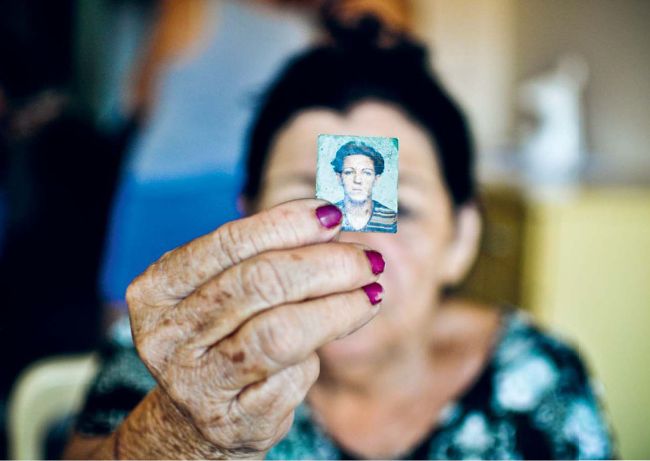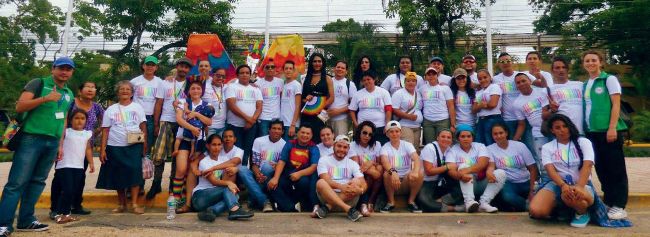Latin America - Stop The Killings
Over the past two decades Latin America has taken the lead in legislative rights for LGBTs, yet there are more killings of LGBT people throughout Latin America than there are in the 12 countries and territories in Africa and Asia, where homosexuality is punishable by death. Eimhin O’Reilly reports on a brutal ‘anti-pink tide’ that’s sweeping across Latin America.

Francisca Ferreira de Vasconcelos showing a photo of her murdered daughter, Dandara dos Santos.
On February 15, 2017, Dandara dos Santos was dragged from her home in the outskirts of Fortaleza, a sprawling seaside city in Brazil’s northeast, by five men. Her attackers were so sure that they would get away with their actions, they filmed their attack on a mobile phone. For five long minutes, they can be seen subjecting Dandara to verbal abuse and physical torture.
Eventually, the cameraman can be heard urging the men to “kill the faggot”. In spite of her pleas for mercy, Dandara is then dragged across the rough cobblestones and tossed limply into a wheelbarrow. The video ends there.
Her body was later found in a nearby alleyway. She had been shot twice in the head, which they then crushed with a rock. Dandara was murdered because she was trans.
The video was shared widely by LGBT+ organisations throughout Brazil and beyond. As it went viral, public outrage grew and Dandara became a symbol of the virulent transphobia that still grips the region, her face plastered across posters, t-shirts and banners. Eventually, the five men featured in the video were found and put on trial. After a lengthy legal battle, the killers were sentenced to a collective term of 83 years.
The fact that there were any legal proceedings at all was highly unusual. Brazil has the world’s highest number of murders of trans and gender-diverse people, with 179 killings in 2017 alone. In fact, Dandara was lucky to make it past 40 at all. According to some estimates, the life expectancy for a trans woman in Latin America can be as low as just 30 years old.
“ Brazil has the world’s highest number of murders of trans and gender-diverse people, with 179 killings in 2017 alone.
While trans people are particularly targeted, all LGBT+ people in Brazil are at risk. A report by Grupo Gay de Bahia, the country’s oldest LGBT+ organisation, describes 2016 as the most dangerous year ever for LGBT+ Brazilians, with a total of 343 documented murders – or one every 28 hours. Since then, that number has continued to grow, with 454 documented murders in 2017.
Brazil is not alone in this surge of anti-LGBT violence. In fact much of Latin America has witnessed the same disturbing phenomenon over the past few years. From 2014 to 2016, there were 202 murders in Mexico motivated by the gender identity or sexual orientation of the victims. Colombia saw 119 murders of LGBT+ people in 2015 alone. Throughout Latin America at least 1,834 trans and gender-diverse people have been murdered since 2008 – nearly three quarters of the reported global total of 2,343.
Yet it is not just the numbers that speak to the flood of hatred LGBT+ people face in Latin America. In many cases, the killings are horrifically violent. Bodies often turn up brutally mutilated, sometimes beyond recognition. In many cases, their genitals and breasts have been removed entirely. Like Dandara, many victims are tortured and verbally abused before their deaths.
While the killings are truly brutal, they are underlaid by a more everyday violence. The price many people in Latin America pay for being LGBT+ can include everything from facing homophobic slurs in the streets to beatings, rape and kidnapping.
The result of all these multiple forms of violence is a community under siege. In fact, there are more killings of LGBT+ people throughout Latin America than there are in the 12 countries and territories in Africa and Asia, where homosexuality is punishable by death.
This puts Latin America in a unique position, not least because it is also home to some of the most progressive legislation in the world. Whereas in 1999, homosexuality was criminalised in almost half the region, over the past two decades Latin America has taken the lead in LGBT rights. Argentina was the tenth country in the world to legalise same-sex marriage in 2010, followed by Uruguay, Brazil, Colombia and a growing number of Mexican states. Chile and Ecuador recognise civil unions. Meanwhile, a landmark ruling by the Inter-American Court of Human Rights in Costa Rica earlier this year called upon Latin America to recognise gay marriage.
“Facing constant threats to their very survival, Latin America’s LGBT+ communities have refused to back down.

Members by Honduran LGBT+ organisation Arcoiris at a Pride event last July in Honduras’s second city, San Pedro Sula. Photo by Osman Carcámo
At the same time, countries and cities throughout the region are chasing after the pink dollar, marketing themselves as the perfect gay-friendly holiday destination. Just last year, Colombia was nominated as the “best emerging LGBT tourist destination”, even while human rights groups like Colombia Diversa were denouncing what they describe as a “purge” of queer people throughout Colombian society.
Why then, in spite of growing gay-friendly legislation and marketing, has homophobic and transphobic violence not just persisted, but surged?
The reasons are multiple. In fact, according to the Transgender Law Centre, so many progressive laws being passed so quickly could itself be a contributing factor, as conservative elements of Latin American society fight back against what they see as an attack on traditional Christian family values.
At the same time, the rise in LGBT+ murders has gone handin-hand with the collapse of the region’s so-called ‘pink tide’ of progressive governments, the resurgence of the Latin American right, and a profound economic, corruption, and security crisis. In Brazil, where roughly one third of the federal government is under investigation for corruption, leading presidential candidate Jair Bolsonaro has suggested that parents of gay children should have “beaten them up more”, and has publicly stated that he would rather have “a dead son than a gay son”. In Paraguay, outgoing right-wing president Horacio Cartes has described gay marriage as something “monkeys swinging from trees do”, and pledged to “shoot himself in the testicles” if his son married another man.
The fact that the public sphere has become infected with hate speech has certainly emboldened some homophobes to believe that they can get away with attacking or even killing LGBT+ people. The sad truth is that they are often right. In a trend that rings true throughout the region, a mere five per cent of murders of LGBT+ people in Honduras are ever prosecuted.
Yet the causes of this severe backlash against progressive politics and LGBT+ people go deeper still. Many corners of Latin America are still dominated by a culture of machismo – the kind of male supremacy, toxic masculinity and rampant misogyny that abounds in this part of the world, and has led to skyrocketing rates of femicide. By subverting traditional gender and sexual norms, LGBT+ people find themselves at odds with this deeplyrooted system of oppression – and pay a heavy price.
While years of liberal legislation may have transformed Latin America’s politics, its effects have yet to trickle down into Latin American society. In order to uproot decades of machismo there needs to be a grassroots shift in cultural values. This is exactly the kind of change that human rights defenders like the Honduran NGO Arcoiris (Spanish for ‘rainbow’) are trying to bring about.
Founded in 2003, Arcoiris is the bedrock of the country’s besieged LGBT+ community, working with LGBT+ people on issues ranging from human rights to mental health and HIV support, while also lobbying the Honduran government and even investigating hate crimes.
Yet Arcoiris is facing attacks on two fronts – not only are they members of the community themselves, they are also promoting human rights in a country with the world’s highest rate of attacks on human rights defenders. Since 2015, six of their members have been killed, including two leaders of Arcoiris’ trans groups, Paola Barraza and Sherlyn Montoya.
For Osman Carcámo, a spokesperson for Arcoiris, the pain of their loss is a familiar one, made all the worse by the fact that no one has been brought to justice for their murders. To Osman, this is no coincidence. Since a military coup in 2009, Honduras has been ruled by a series of authoritarian governments that have decimated the leadership of Honduras’s LGBT community.
“Sadly, many leaders have gone into exile in different continents to save their lives. They have been completely isolated from their work as defenders, thanks to the lack of care from the very same State that should guarantee the wellbeing of its society without any distinction whatsoever… [the Honduran State] is complicit when it keeps quiet and does nothing to eradicate the hate crimes against the LGBT community”.
Facing constant threats to their very survival, Arcoiris and the Latin America’s LGBT+ communities have refused to back down. Instead, Osman describes how they have endeavoured to build a stronger community to weather the storm. One “united in solidarity… with the defenders, activists, brothers and sisters in all vulnerable groups”.
For those of us in Ireland, Osman offers a roadmap to what that kind of solidarity would look like. In an environment as hostile as Honduras, something as simple as a friendly message of support to their Facebook page can be enough to keep them going. Writing to the Irish government and the Latin American embassies in Ireland and the UK can help to demand protection and justice for members of the region’s LGBT+ community, as well as supporting the work of Irish organisations like Front Line Defenders, the Latin America Solidarity Centre, and Peace Brigades International Ireland.
One of the greatest challenges in the region is the delegitimising of organisations like Arcoiris, whose work is constantly belittled and undermined in both official and unofficial channels. To fight this, Osman asks us to “publicly recognise the struggle and the work of all human rights defenders”, starting with writing and sharing articles, tweets and posts about the surge of anti-LGBT+ violence.
Without international support and attention, Osman, Arcoiris, and all of Latin America’s LGBT+ communities will be left to suffer in silence. But if there is one thing we can learn from them, it is the strength to continue fighting in the face of constant setbacks and violence.
For LGBT+ rights defenders like Osman, “Our challenge is to keep up the fight, even when we do not know if we will make it to see the morning. But we have the conviction to stay in the fight because our rights must be recognised.”
‘Stop The Killings’, a report on the killings of human rights defenders in Latin America, edited by Front Line Defenders was launched on June 21